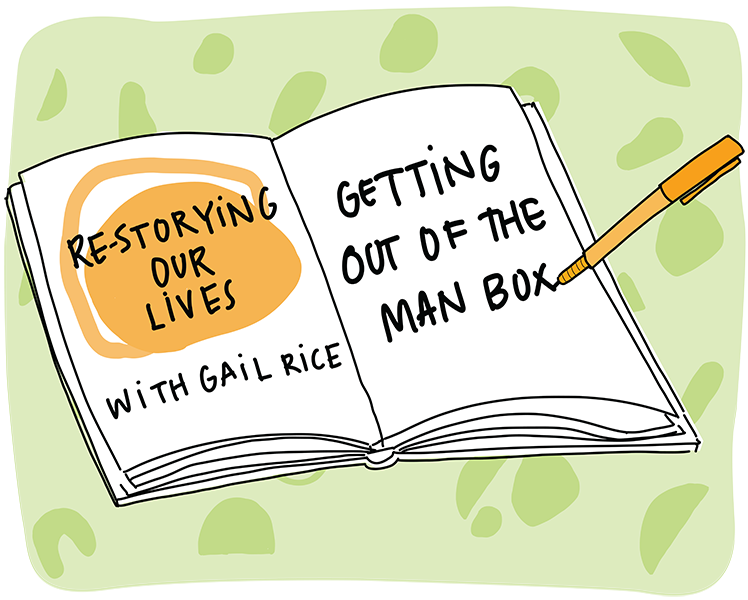

Getting out of the Man Box
February 23, 2020
9:00 am - 1:00 pm

Getting out of the Man Box
Is this workshop for me?
- You are at a crossroads facing loss and/or change in yourself, your relationships, your work
- You are feeling inspired and excited and you want to get the most of this in the present and future
- You long for better relationships with your partners, your children, your friends – you feel isolated, lonely
- You are at an exciting crossroad in your life – new partner, baby, job etc
- You want to find something in life that brings you joy, passion
- You want to be a ‘better’ father, friend, partner
- You are feeling depressed, angry, frustrated, sad
- You struggle with identifying and expressing your emotions
- You feel not good enough, worthless
Whether your life is going really well or you are struggling, all of us can benefit from taking time to stand back, reflect, reevaluate and reframe our lives. Writing is a non confrontational technique which has been shown to help people identify unhelpful stories and develop strategies to rewrite, reframe and restory their world.
Men and Mental Health
We are all subject to the cultural stereotype that so many boys and men grow up with: the assumption that they are strong; that they can take it; that they will tough it out. In Australia, we know that in their lifetime, one in eight men is likely to experience depression and one in five will experience anxiety.
Australian males have higher rates of suicide than women, lower rates of mental health literacy and higher levels of associated stigma. Untreated depression and anxiety are significant contributing factors to this. Men can be reluctant to seek help when they feel overwhelmed. As a result, they may live with untreated and often undiagnosed mental health conditions that impact the quality of their life.
Statistically, women experience higher rates of anxiety and depression than men. Men, on the other hand, are less likely to see their reactions as depression, and are more likely to use alcohol, porn, work or other unhelpful strategies to try to deal with it. Men are also less likely to reach out for help when they need it.
Many men are wired to keep their feelings to themselves, to just ‘get on with it’, ‘she’ll be right’. Men are told directly and indirectly, time after time, that talking about how they’re feeling is somehow weak or un-manly. This kind of thinking can be really harmful, not just for men themselves, but for the people around them, too.
Some facts
- Men are three times more likely to die by suicide
- Suicide kills an average of eight people a day in Australia, six men and two women.
- Men account for only 40% of the Medicare subsidised health services in Australia
- Men are nearly twice as likely to die through drug use
- Male deaths by alcohol abuse related causes are as almost twice that of females
- Depression is still a significant factor in the high male suicide rates, but not in the majority of cases. Male suicides are more commonly linked to a range of distressing life events such as relationship separation (28.3%); financial problems (17%); relationship conflict (15.7%); bereavement (12.3%); recent or pending unemployment (10.5%); familial conflict (9.5%) and pending legal matters (9.0%).
Many men are taught that many ‘head issues’ are nothing to worry about and should be dismissed. There is a growing recognition that mental health concerns are in fact serious issues and the culture of dismissal is a dangerous approach. Unfortunately many men are still not aware of some of the most common indicators that there’s a problem that should be dealt with before it grows into something bigger.
The power of expressive writing
The connection between expressive writing and wellness has been notably explored by Dr. James Pennebaker at the University of Texas at Austin. In one study he hypothesised that labelling and acknowledging emotional experiences may change the way the person views themselves. ‘Writing about different experiences, rather than keeping them bottled up inside also makes the person feel better emotionally’. (Smyth and Pennebaker 2008.)
An increasing number of studies indicate that having people write about their deeply felt emotions and thoughts can result in healthy improvements in social, psychological, behavioural, and biological measures.
What to expect in this workshop
- No experience in writing is necessary
- This is not a therapy group – you will not be asked to ‘share’ your stories
- This is not a traditional writing group – you will not be asked to read anything out loud, nor will you show anyone else your writing
- This is a place to discover the power of writing as a tool to help you explore old stories that hold you back from life and create new stories to help you become the man you want to be.
Some of the themes we will explore in the workshop
- How definitions of masculinity have limited men and hurt us all
- How exploring your emotional world and becoming more confident about who you are and what you need can improve relationships in all areas of your life
- How writing can help you access feelings that are difficult to identify or express verbally
- Identify what you want and need outside the confines of societal roles and expectations
- Explore some old stories that have been holding you back from the life you want
- You could benefit from the workshop if
Comments Questions
I am anxious – I won’t feel comfortable in a group
As a psychologist and facilitator I am committed to ensuring that the workshop space is safe, confidential and has a range of exercises to encourage everyone’s participation. The power of working in a group in this creative way is that simply by spending a morning with others with similar experiences and challenges can often reduce our sense of aloneness and shame and increase our sense of agency and optimism.
I am not creative
This writing workshop, like all of the writing workshops I run, are open to everyone. Once we learn to trust ourselves and let the pen move across the page we all discover or rediscover our creative voice. The wide range of exercises ensure that you will find something that will resonant with you, your needs and your style.
I am worried that I might discover some difficult stories and feelings in the workshop.
Yes these exercises can be very powerful and we can unearth feelings and stories that we didn’t know we had or were long forgotten. The workshop moves quickly from one exercise to the other, so there will never be a time when you ‘feel trapped’ in difficult emotions. There are always strategies to ‘write our way out of difficult emotions’ in each exercise. As an experienced facilitator and psychologist, I am skilled at managing a range of emotions in a group.
I am not a writer
This workshop will introduce you to a broad range of writing strategies designed to cater to different styles of thinking. As a facilitator I am aware of the courage it takes to join one of these groups and I aim to provide a space where you can set aside for a few moments self judgement, criticism, and feelings of unworthiness and just trust as you move the pen across the page. These exercises are designed to enable you to give yourself the freedom and space to listen to yourself without fear of criticism. You may begin to see how powerful writing is as a tool to explore past, present and future. It is a technique for exploration available to us all.
Explore how the power of writing can help you be a live a fuller, happier and more connected life
If you are interested in joining this workshop contact me.
This workshop is open to anyone who wants to discover how writing can help us identify, name and re-story old stories which no longer serve us. Learn how to free yourself from these old stories and live more fully. Be the person, partner, father, brother, son, friend and colleague you want to be.
